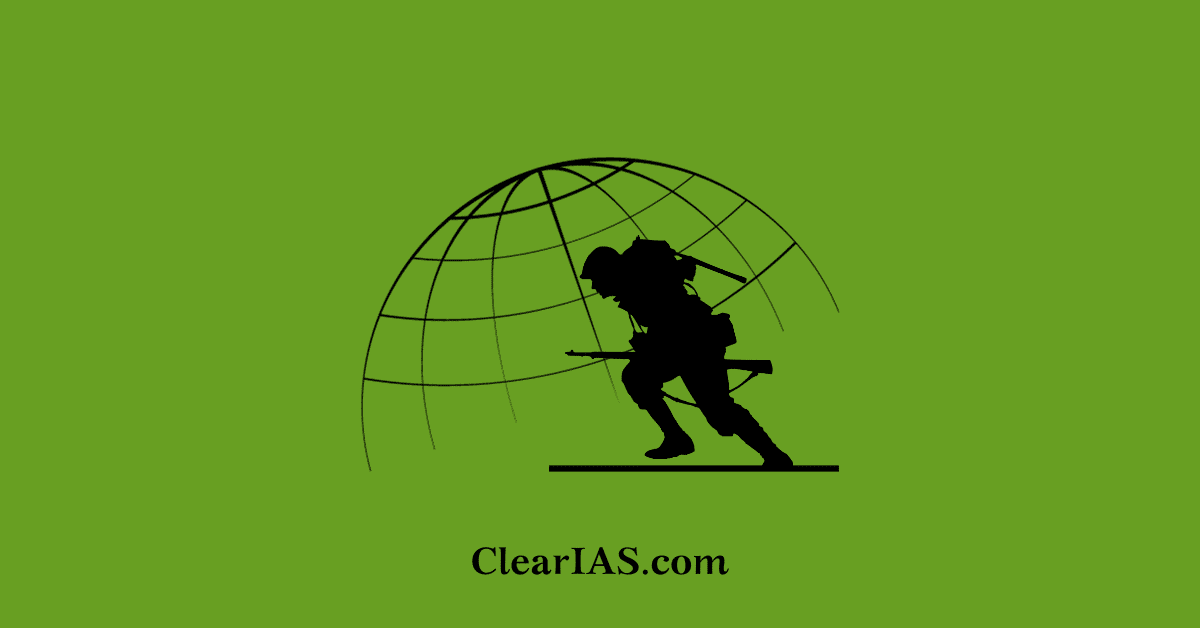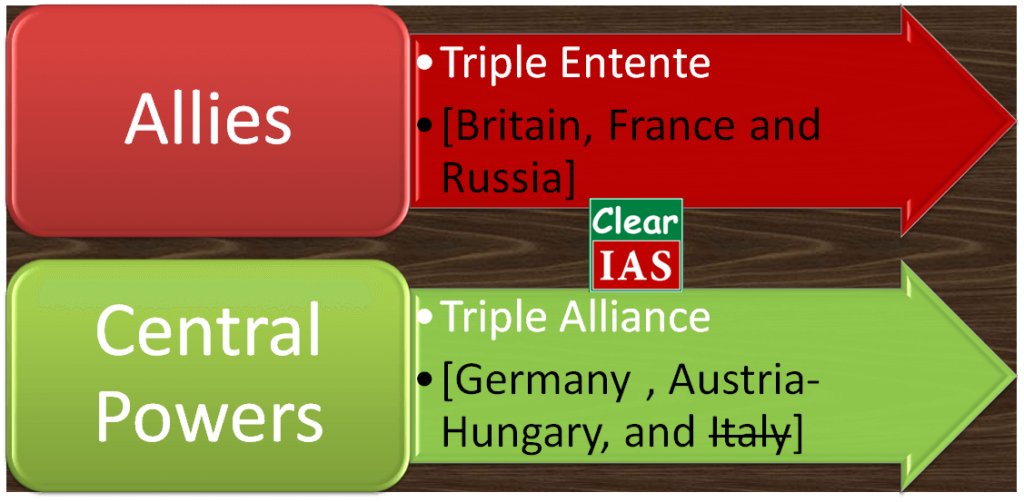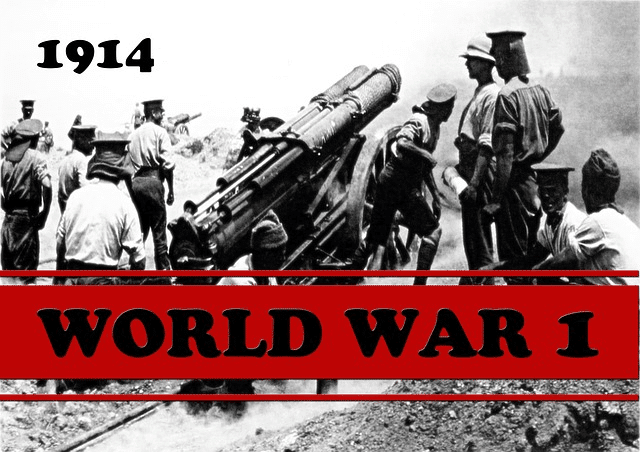 First World War (World War I) is considered as one of the largest wars in history. The world’s great powers assembled in two opposing alliances: the Allies (British Empire, France and the Russian Empire) versus the Central Powers (Germany and Austria-Hungary). WWI lasted from 28 July 1914 to 11 November 1918.
First World War (World War I) is considered as one of the largest wars in history. The world’s great powers assembled in two opposing alliances: the Allies (British Empire, France and the Russian Empire) versus the Central Powers (Germany and Austria-Hungary). WWI lasted from 28 July 1914 to 11 November 1918.
The Two Groups: Allies vs Central Powers

Causes of the First World War
In the background there were many conflicts between European nations. Nations grouped among themselves to form military alliances as there were tension and suspicion among them. The causes of the First World War were:
(1) Conflict between Imperialist countries: Ambition of Germany
- Conflict between old imperialist countries (Eg: Britain and France) vs new imperialist countries (Eg: Germany).
- Germany ship – Imperator.
- German railway line – from Berlin to Baghdad.
(2) Ultra Nationalism
- Pan Slav movement – Russian, Polish, Czhech, Serb, Bulgaria and Greek.
- Pan German movement.
(3) Military Alliance
- Triple Alliance or Central Powers (1882) – Germany, Italy, Austria-Hungary.
- Triple Entente or Allies (1907) – Britain, France, Russia.
Note: Although Italy was a member of the Triple Alliance alongside Germany and Austria-Hungary, it did not join the Central Powers, as Austria-Hungary had taken the offensive, against the terms of the alliance. These alliances were reorganised and expanded as more nations entered the war: Italy, Japan and the United States joined the Allies, while the Ottoman Empire and Bulgaria joined the Central Powers.
(4) International Anarchy
- Secret agreement between Britain and France allowing Britain to control Egypt and France to take over Morocco. Germany opposed, but settled with a part of French Congo.
- Hague conference of 1882 and 1907 failed to emerge as an international organisation.
(5) Balkan Wars
- Many Balkan nations (Serbia, Bulgaria, Albania, Greece and Montenegro) were under the control of Turkey. They defeated Turkey in the First Balkan War. The subsequent war was between the Balkan countries themselves – Eg: Serbia vs Bulgaria.
- Defeated countries like Turkey and Bulgaria sought German help.
(6) Alsace-Loraine
- During German unification, Germany got Alsace-Loraine from France. France wanted to capture Alsace-Loraine back from Germany.
(7) Immediate Cause: assassination of Francis Ferdinand
- Austrian Archduke Francis Ferdinand was assassinated by a Serbian native (in Bosnia). Austria declared war on Serbia on 28th July, 1914. [Reason for assassination: Annexation by Austria the Bosnia-Herzegovina, against the congress of Berlin, 1878]
The Course of the War

- Group 1 (Allies): Serbia, Russia, Britian, France, USA, Belgium, Portugal, Romania etc
- Group 2 (Central Powers): Austria-Hungary, Germany, Italy, Turkey, Bulgaria etc.
- War on Western Side: Battle of Marne.
- War on Eastern Side: Battle of Tennenberg (Russia was defeated).
- War on the Sea: Batter of Dogger Bank (Germany was defeated), Battle of Jutland (Germany retreated).
- USA entered in 1917.
- Russia withdrew in 1917 after October Revolution.
Treaty of Versailles, Paris
- Germany signed a treaty with Allies (Triple Entente) on 28th June 1919. It was signed at Versailles, near Paris. (14 points)
- Leaders: Clemenceau – France, Lloyd George – Britain, Woodrow Wilson – USA, Orlando – Italy.
Treaties after World War I
Note: Subscribe to the ClearIAS YouTube Channel to learn more.
- Treaty of Paris – with Germany.
- Treaty of St.Germaine – with Austria.
- Treaty of Trianon- with Hungary.
- Treaty of Neuilly – with Bulgaria.
- Treaty of Severes – with Turkey.
Consequences of First World War
- Rule of King ended in Germany: Germany became a republic on November 1918. The German Emperor Kaiser William II fled to Holland.
- Around 1 crore people were killed.
- Unemployment and famine.
- Epidemics.
- The fall of Russian empire after October revolution (1917) which resulted in the formation of USSR (1922)
- Emergence of USA as a super power.
- Beginning of the end of European supremacy.
- Japan became a powerful country in Asia.
- Poland, Yugoslavia and Czechoslovakia became new independent states.
- Baltic countries – Estonia, Latvia and Lithvania – became independent.
- Rule of Ottamans came to an end in Turkey.
- New boundary lines were drawn for Austria, Germany and Turkey.
- Strengthened independence movements in Asia and Africa.
- League of Nations came into being.
- Germany had to return Alsace-Loraine to France.
- German colonies were shared.
- Germany gave up Saar coal field.
- Germany gave up Polish corridor, and made city of Danzig independent.
- Monarchy was abolished in Germany, Austria, Hungary, Turkey and Russia.
- The harsh clauses of the Treaty of Versailles finally resulted in the second world war.





Thank u
keep your feet covered
Very well
Nice and precise
Thanks.. It’s good
That was very essential
thank you very much.
hii
Good…..
In the course of war, italy is mentioned with central powers while it has joined the allies. Please clarify
shut up idiot
Its very good answer😊
Helpful resources
Very nice covered
U should defined it little more ….but overall it is good
You didn’t mention about the powerful weapons that was owned by the European countries. Please clarify that portion. Otherwise it’s a very precise and useful note. Thank you.
Thank you
very good answer
Thanks a lot.
Very nice😊
Thank you
Its a very nice answer
Thus I can get full marks
So i am thankful to you
Thank you
you are my rolemodal
nice task….& thanks alot…!!!!
I really appreciate may Almighty reward you with goodness
Was very useful for ICSE projects (history and civics). Thanks a lot.
Ath polichu….😁😂
Very good sir
Thank you. Learnt a lot
Thanks alot sir I will really like to learn more sir
Thanks, It was nice!
Thanks, it helped in-home assignment
You forgot to mention ottoman empire
You forgot to mention ottoman empire in the central power
Interesting topic.
Great job .
Thank you.
I like how well u explained ww1 it’s a really good. I Like this article this article is a reliable source!
Thank U For Making This Helped Me With History Thanks Learned Alot!!!!!!
YOu forgot to tak about the ottoman emprire
Nice but no clear explanation
World War I, also known as the First World War, was a massive conflict that occurred from July 28, 1914, to November 11, 1918. It involved major global powers divided into two alliances: the Allies (comprising the British Empire, France, and the Russian Empire) and the Central Powers (Germany and Austria-Hungary). The war’s causes were multifaceted, including conflicts between imperialist countries, Germany’s ambitions, ultra-nationalism, military alliances, international anarchy, Balkan Wars, Alsace-Lorraine dispute, and the assassination of Francis Ferdinand. The war led to significant consequences and the Treaty of Versailles in Paris, which aimed to establish peace. 🌍💥🤔
World War I, a colossal conflict from 1914 to 1918, involved major powers forming two opposing alliances: the Allies (including the British Empire, France, and Russia) against the Central Powers (Germany and Austria-Hungary). Key causes were imperialist rivalries, with Germany’s ambitions and military buildup, ultra-nationalism fueling movements like Pan-Slav and Pan-German, military alliances (Triple Alliance and Triple Entente), and international disputes like Egypt and Morocco. These tensions escalated until the assassination of Francis Ferdinand triggered the war. The aftermath brought the Treaty of Versailles and reshaped the world order, marking a pivotal moment in history. 🌍🔥🕊️ #WWI #History